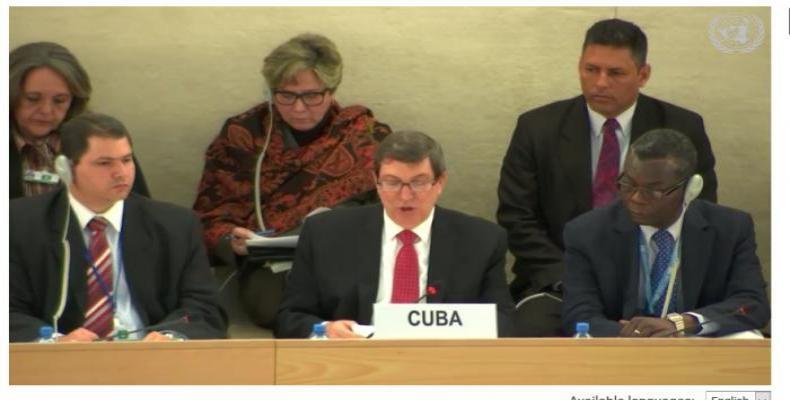Geneva, May 15(RHC)—Cuba’s Foreign Minister, Bruno Rodríguez Parrilla, ratified Wednesday the island´s commitment with the safeguarding and respect of the human rights of its citizens, during the presentation in Geneva of the island´s national report to the Universal Periodic Review of the UN Human Rights Council.
In his remarks, Rodriguez explained that the document was the result of broad consultations with numerous government institutions and civil society organizations, and that it summarized the island´s response to the recommendations it received during the last Universal Periodic Reviewing in 2013.
The minister added that the data provided show that Cuba continues the work to improve its economic and social development model and that its society´s main goal is to 'build a sovereign, independent, socialist, democratic, prosperous and sustainable nation', by strengthening the institutional framework of its political system.
Moreover, he said that the legal-institutional framework for the protection and promotion of human rights continue to be strengthened with modifications and proposals that match the needs and realities of the Cuban society and international standards.
'The protection of the right to life has remained the highest priority,' he said, and mentioned concrete elements to illustrate this assertion, such as that there is no sale or trafficking of firearms and homicide rates are very low, which contributes to the fact that the island is one of the safest countries in the world.
He also pointed out that the country continues to reinforce popular participation in the taking of governmental decisions and the exercise of the freedoms recognized in the Constitution and laws, including civil and political rights, which are fully protected.
'In the country there is a wide plurality of ideas; and there is a rich debate about the most diverse topics of the political, economic, social and cultural life of the nation, 'he said.
The presentation of the national report prompted dozens of representatives of nations to express their support and admiration for Cuba for the progress made in this area.
Senegal, Serbia, Zimbabwe and Ecuador highlighted projects promoted in favor of children and adolescents on the Caribbean island and welcomed the government's inclusive plans for people with disabilities.
For their part, Argentina, Portugal, Honduras and Mali congratulated Cuba for taking literacy experiences beyond its borders and helping rid millions of people in the world of illiteracy.


